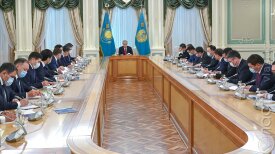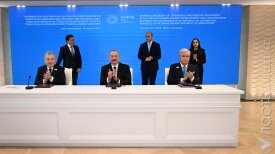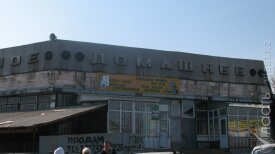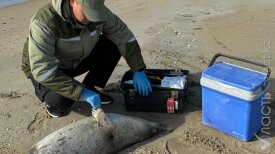Speaking at the BRICS summit in the Russian city of Kazan on October 24, Kazakhstan’s President Kassym-Jomart Tokayev said the ongoing geopolitical tensions should be reduced. Tokayev said that Kazakhstan “highly values Russia’s concept of creating equal and indivisible security in Eurasia”. Earlier this month, Kazakhstan said it would not join the BRICS group, where it remains as an observer country.
The Kyzylorda police department said on October 21 that it holds in custody eleven suspects, including five minors, in the case of sexual slavery that had emerged in August in the southern city. According to early testimonies, school administrators, as well as the local police, were aware of the violence that a 16-year-old girl was subjected to. Marat Kozhayev, a senator and a former deputy minister of internal affairs, told the press on October 24 that the trial will be held behind closed doors and that “journalists stir up a commotion in the information field”.
Kazakhstan plans to export up to 12 million tons of grain in 2024, the deputy minister of trade Kairat Torebayev said on October 23. The plan follows a record-breaking harvest of 26.5 million tons among wheat, barley, and corn. Last week, Russia’s agriculture watchdog Rosselkhoznadzor halted imports of wheat - but also of cut flowers, which Kazakhstan re-exports from the Netherlands, Poland, and Belgium - alleging the presence of pests. Earlier in October, Kazakhstan had refuted allegations regarding the presence of pathogens in its agricultural exports.
During a joint meeting with Afghanistan business representatives on October 22, Yerlan Akkenzhenov, deputy minister of energy, said that Kazakhstan is negotiating a participation in the Turkmenistan-Afghanistan-Pakistan-India (TAPI) gas pipeline. The long-delayed TAPI pipeline has faced difficulties over geopolitical tensions and instability in Afghanistan, which announced in September the start of construction work on its section.
Tokayev appointed Kanatai Dalmatov to the post of deputy chairman of the National Security Committee (KNB) on October 19. In the past few weeks, the president had reshuffled several deputies of the KNB.
Murat Daniyar, the executive director of Kazakhstan’s branch of anti-corruption watchdog Transparency International and the host of the YouTube channel Zhurttyn Balasy (Kazakh slang for “Good Boy”), was summoned by the Almaty police on October 22. He is suspected to have disseminated false information ahead of the “nuclear referendum”. On October 6, a referendum on whether to build a nuclear power plant in the country passed with 71.1% of the votes in favor, amid a severe censorship of the “no” campaign.
Four Karakalpak activists who were denied asylum in Kazakhstan flew to the US, Radio Free Europe/Radio Liberty reported on October 24. The four, who had been detained in Kazakhstan in the aftermath of civil unrest in neighboring Uzbekistan, petitioned for asylum in Kazakhstan for fear of political persecution. Kazakhstan’s authorities repeatedly postponed, and ultimately denied, their request.
Vyacheslav Abramov, founder of Vlast and Central Asia editor for Organized Crime and Corruption Reporting Project (OCCRP), was named on October 22 among the new members of the International Consortium of Investigative Journalists (ICIJ). With more than two decades of experience working in the media sphere, Abramov is the first journalist from Kazakhstan to join the ICIJ. Through his work with Vlast and OCCRP, Abramov contributed to several ground-breaking investigations into corruption and crime in Kazakhstan.
Happy Republic Day!
Поддержите журналистику, которой доверяют.








